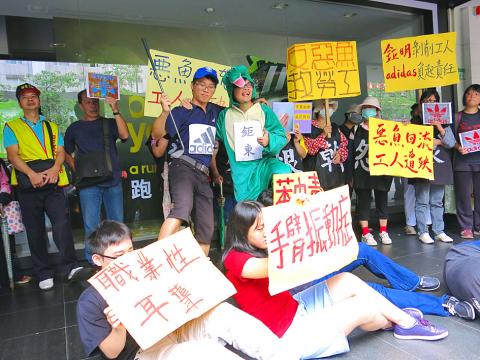Local labor groups urged sportswear giant Adidas yesterday to address poor working conditions at the factories of its Taiwanese suppliers in China, amid complaints of occupational diseases and health issues, such as benzene poisoning.
The activists pressed their calls in front of Adidas’ flagship store in Taipei in a protest that was part of a movement jointly launched by labor activists in Taiwan, China, Hong Kong and Indonesia, the protesters said.
Their primary target was Dynamic Precision Industry Corp (鉅明), a Taiwanese supplier that produced golf clubs for Adidas at its factory in Guangzhou, China, before recently shutting down its production line.

Photo: CNA
The activists accused the company of having maintained poor working conditions at the Guangzhou plant, which they said affected about 100 workers.
Some of them went deaf, while others have experienced benzene poisoning, or developed pneumoconiosis or hand-arm vibration syndrome, the activists said.
The Guangzhou plant’s management responded to the health complaints by laying off the workers and paying them severance, the activists alleged.
Those who refused to leave their jobs were pressured into doing so when the company cut their wages and eventually halted production, they said.
The protesters also expressed their opposition to Dynamic Precision Industry’s plan to move back to Taiwan, shouting the slogan: “Bad fish swims back, victimizing workers in Taiwan.”
Workers at another Taiwanese factory in China that makes goods for Adidas also came down with benzene poisoning, and one of them died in March, the activists said.
They called on Adidas to meet its social responsibilities by improving working conditions at its contract manufacturers and opening itself to supervision by labor groups.
They demanded that Adidas properly compensate the six workers from Dynamic Precision Industry with hand-arm vibration syndrome and see to it that workers suffering from benzene poisoning receive immediate treatment.
Lin Fan-shun (林凡舜), a public relations manager at Adidas, accepted a petition presented by the labor groups, but said he was not authorized to comment on the complaints because they involved manufacturers in China.
Lin also declined to respond positively to the activists’ request for a reply to their demands within five days.

Sweeping policy changes under US Secretary of Health and Human Services Robert F. Kennedy Jr are having a chilling effect on vaccine makers as anti-vaccine rhetoric has turned into concrete changes in inoculation schedules and recommendations, investors and executives said. The administration of US President Donald Trump has in the past year upended vaccine recommendations, with the country last month ending its longstanding guidance that all children receive inoculations against flu, hepatitis A and other diseases. The unprecedented changes have led to diminished vaccine usage, hurt the investment case for some biotechs, and created a drag that would likely dent revenues and

Macronix International Co (旺宏), the world’s biggest NOR flash memory supplier, yesterday said it would spend NT$22 billion (US$699.1 million) on capacity expansion this year to increase its production of mid-to-low-density memory chips as the world’s major memorychip suppliers are phasing out the market. The company said its planned capital expenditures are about 11 times higher than the NT$1.8 billion it spent on new facilities and equipment last year. A majority of this year’s outlay would be allocated to step up capacity of multi-level cell (MLC) NAND flash memory chips, which are used in embedded multimedia cards (eMMC), a managed

CULPRITS: Factors that affected the slip included falling global crude oil prices, wait-and-see consumer attitudes due to US tariffs and a different Lunar New Year holiday schedule Taiwan’s retail sales ended a nine-year growth streak last year, slipping 0.2 percent from a year earlier as uncertainty over US tariff policies affected demand for durable goods, data released on Friday by the Ministry of Economic Affairs showed. Last year’s retail sales totaled NT$4.84 trillion (US$153.27 billion), down about NT$9.5 billion, or 0.2 percent, from 2024. Despite the decline, the figure was still the second-highest annual sales total on record. Ministry statistics department deputy head Chen Yu-fang (陳玉芳) said sales of cars, motorcycles and related products, which accounted for 17.4 percent of total retail rales last year, fell NT$68.1 billion, or

In the wake of strong global demand for AI applications, Taiwan’s export-oriented economy accelerated with the composite index of economic indicators flashing the first “red” light in December for one year, indicating the economy is in booming mode, the National Development Council (NDC) said yesterday. Moreover, the index of leading indicators, which gauges the potential state of the economy over the next six months, also moved higher in December amid growing optimism over the outlook, the NDC said. In December, the index of economic indicators rose one point from a month earlier to 38, at the lower end of the “red” light.